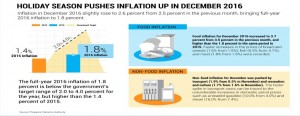
MANILA, Philippines – Inflation in December 2016 slightly rose to 2.6 percent from 2.5 percent in the previous month, bringing full-year 2016 inflation to 1.8 percent, according to the National Economic and Development Authority (NEDA). “The uptick in inflation last month was caused by price increases partly due to the holiday season and supply constraints on some food items,” said Socioeconomic Planning Secretary Ernesto M. Pernia. The full-year 2016 inflation of 1.8 percent is below the government’s target range of 2.0 to 4.0 percent for the year, but higher than the 1.4 percent of 2015.
Food inflation for December 2016 increased to 3.7 percent from 3.5 percent in the previous month, and higher than the 1.8 percent in the same period in 2015. Faster increases in the prices of bread and cereals (1.6% from 1.5%), fish (5.5% from 4.7%), and meat (1.8% from 1.5%) were recorded. Non-food inflation for December was pushed by transport (1.9% from 0.5% in November) and recreation and culture (1.7% from 1.6% in November). The faster spike in transport costs can be traced to the considerable increases in domestic petrol prices such as unleaded gasoline (10.0% from 3.98%) and diesel (16.04% from 7.41%). “The higher prices in transport commodity reflected the hike in international oil prices caused by oil-producing countries’ decision to cut oil production by almost 1.8 million barrels per day,” said Pernia. Core inflation, which excludes selected volatile food and energy prices, also inched up to 2.5 percent in December 2015 from 2.4 percent in the previous month.
The 2016 full year core inflation averaged at 1.9 percent, still lower than the 2.0 percent recorded in 2015. “This indicates slower price movements across a relatively wide range of commodity items,” the Cabinet official said. For 2017 and 2018, the government expects inflation to be within the target range of 2.0 to 4.0 percent. This already considers the scenario of higher oil prices, pending petitions for adjustments in electricity rates, but especially, strong domestic economic activity. “The inflation outlook is supported by the country’s brisk domestic demand conditions, buoyed by solid private household spending, higher government expenditure, and adequate domestic liquidity,” said Pernia. Pernia also noted that the damage to rice resulting from typhoons Karen, Lawin, and Nina could lead to faster inflation in early 2017. Rice comprises a sizeable portion of the Consumer Price Index basket.
“The volatility in rice prices could affect the overall welfare of the Filipino families, particularly the poor who spend around 20 percent of their incomes on rice. Therefore, the government needs to promote more resilient practices for rice production to minimize the impacts of climate-related shocks,” he said.








Leave a Reply